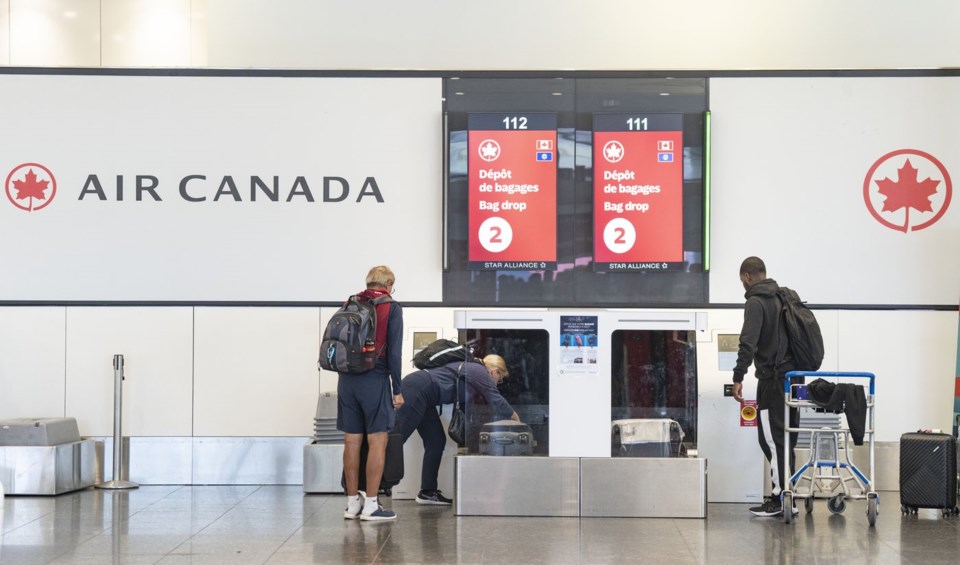More than 10,000 flight attendants for Air Canada will begin voting next week on a new tentative agreement that raises wages and establishes a pay structure for time worked when aircraft are on the ground.
The airline and its union agreed to the deal Tuesday morning with the help of a federal mediator, ending a strike that upended thousands of customers' travel plans.
Terms of the tentative deal shared by the Air Canada component of the Canadian Union of Public Employees on its website include a 12 per cent salary increase this year for most junior flight attendants, while more senior members are set for an eight per cent pay bump.
All members are set for a three per cent raise in 2026, followed by 2.5 per cent in 2027 and 2.75 per cent in 2028.
The proposed deal must be ratified by the flight attendants, with a vote scheduled to take place from Aug. 27 to Sept. 6.
However, while members are set to vote on the full package, a large chunk of the terms within it — such as those setting out rules for pensions and retirement bridging, health benefits, prone rest and vacation — are already considered final, as agreed to by both Air Canada and the union.
If the deal is not ratified by union membership, CUPE said all terms excluding those surrounding wages would still form part of the new collective agreement for Air Canada's flight attendants.
The wages portion of the agreement would then proceed to arbitration, where a third-party arbitrator would make a final decision.
The tentative agreement, which would run until March 2029, addresses the contentious issue of unpaid work while airplanes are not in the air.
Starting this year, flight attendants would receive half their hourly wage rate for 60 minutes of ground time on narrow-body aircraft and 70 minutes on wide-body planes. That would rise to 60 per cent of the hourly wage rate next April, 65 per cent in 2027 and 70 per cent in 2028.
The terms surrounding ground pay are also considered final, regardless of the results from the upcoming ratification vote.
York University labour professor Steven Tufts said the end to unpaid ground work for Air Canada's flight attendants could set a precedent for the industry.
"The majority of carriers still and historically did no ground time. They put everything into the rate for time in the air," he said.
"Now that the flagship carrier has it, I think the other small airlines will be more likely to follow suit."
Tufts noted the ground pay terms of the Air Canada deal are similar, but not identical, to provisions at Delta Air Lines in the U.S. Delta, whose flight attendants aren't unionized, in 2022 started paying for ground time at half the hourly rate, capped around 50 to 60 minutes.
"I think what happened is that the parties actually looked at that agreement and ... did not necessarily borrow the language, but they borrowed the model," he said.
Last year, American Airlines flight attendants also secured pay for boarding time through a union contract. Air Transat flight attendants tried but were unable to get it established during contract talks early last year, Tufts added.
It's also likely to be a key issue for WestJet flight attendants whose contract concludes at the end of 2025.
"This has been a global campaign. It's just not Air Canada flight attendants. And this is something that's been overdue," Tufts said.
On Monday, Jobs Minister Patty Hajdu said Ottawa is launching a probe into "allegations" of unpaid work in the airline sector. She called concerns about the pay system "deeply disturbing," and said if the probe determines those allegations are well-founded, she is prepared to introduce legislation that would close such loopholes.
Air Canada's flight attendants went on strike last Saturday. Hajdu intervened in the strike less than 12 hours later, invoking Section 107 of the Canada Labour Code to force the airline and the union into binding arbitration. The Canada Industrial Relations Board ordered flight attendants to return to work Sunday.
That order was defied by union officials, leading the board to state Monday that the strike was unlawful even as the union said it would press ahead.
The company and union resumed negotiations Monday evening before reaching a tentative agreement overnight.
Two days after restarting operations following the strike's conclusion, Air Canada said Thursday most of its domestic and international routes would be back up and running.
An online dashboard tracking Air Canada's service resumption said Thursday morning that 98 per cent of domestic flights were expected to operate over the next 24 hours, along with 99 per cent of U.S. flights.
The airline's ramp-up of international flights has also nearly caught up, with 94 per cent of planned flights expected to operate.
It is expected to take up to 10 days for service to return to normal levels across Air Canada and Air Canada Rouge.
On Wednesday, the company said it was adopting a policy to reimburse certain customers if they booked alternative transportation in lieu of cancelled flights between Aug. 15 and Aug. 23.
This report by The Canadian Press was first published Aug. 21, 2025.
Companies in this story: (TSX:AC)
Sammy Hudes, The Canadian Press



